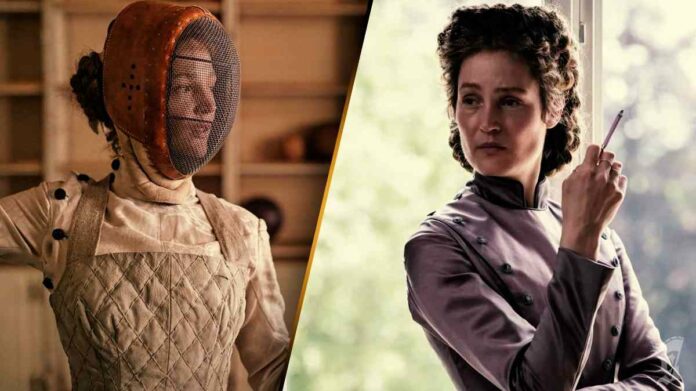I have often contemplated what the word “feminism” entails beyond a concoction of ideologies, arguments, anger, and rebellion. Films that set out to explore the nuances of identifying with “the second sex” often feature undaunted, troubled, mercurial women, and there seems to be a certain enchanting quality about them—a quality that does not abide by societal or moral conventions. But such personalities are never just works of fiction. In fact, it is often the other way around. Time and again, we have witnessed such distinctive personalities who have raised not only eyebrows but also questions that can be traced back to the fundamentals of being human, and their lives have transpired as stories. Kreutzer’s rendition of the infamous Empress Elisabeth of Austria chooses to inquire through the lens of a waning queen, captive of her own mind and is a critique not only of womanhood but also of the human psyche.
For an empress who was widely celebrated for something as ephemeral as her beauty, the autumn of her life is a precarious place to be. And this is where Kreutzer begins her tale. Her Elisabeth, impeccably executed by Vicky Krieps, is in her forty-first year. A gnawing sense of meaninglessness has crept up on her. As her beauty eludes her, she is as agonized as a knight might be when he suddenly realizes that he is losing his right arm. Towards love, she harbors a gravely cynical view and feels that it is only utilitarian and self-gratifying. And yet, she ostensibly suffers from the lack of it.
It is difficult to pinpoint the exact source of Elisabeth’s distress. The fact that her presence is merely ceremonial and her opinion counts for nothing leaves her utterly discontented. Her beauty was the only weapon that she had learned to wield. She watches it ebb away irrevocably, and her mind has transformed into a battlefield for contradictory emotions. Subjecting herself to strict physical regimes, she feels that the only way to retain her position of power is to continue to be the epitome of beauty and grace that people perceive her to be. But her restlessness suggests otherwise, as none of her ventures restore her happiness. Her caprices make her the heart of public scandal. It is quite paradoxical that her impetuous actions constantly elude the very thing that she tries so hard to achieve. There seems to be a perpetual tug of war between what she is and what the world makes of her.
One might be inclined to conjecture as to whether Kreutzer’s Elisabeth is truly a free spirit, or merely unable to accept the inevitable. And therein lies the conundrum. Her austere demeanor, withdrawal from public appearances, and complete disregard for propriety might give the impression that she is a heretic. But at the same time, we find her starving herself during meals, being unable to sleep, obsessing over her body weight, and relentlessly tightening her corset. Both her health and her sanity are terribly compromised as she strives to attain her nebulous ideal and flickers like a dying flame.
It may be interesting to note that the corset takes center stage in the film and even finds its way into the title. One might ask, “Is it an allegory for the dehumanizing decorum of our anachronistic society?” And do Elisabeth’s actions stem from a certain disdain that she feels towards such a society? But it is undeniable that her indignation does not bring her peace. It somehow reminds me of Virginia Woolf’s widely acclaimed essay, “A Room of One’s Own,” where she writes about this inexorable anger that often appears as the first and most natural response to oppression. But there is a disruptive quality to this anger, which mingles with a variety of emotions to form a convolution and clouds one’s self-expression.
There are, indeed, spectacular moments of communion that can be found in the film. But one has to strip oneself bare of all notions of morality to be able to appreciate them. Not much is given away about Elisabeth’s cousin, Ludwig, except that his presence is quite inappropriate. She finds in him a companion for her intellect as well as her spirit. Unlike her other lovers, she does not seek his company to inflate her vanity. The nature of the desire that she feels towards him is quite visceral, and hence, when he refuses to physically indulge with her, it comes as a jolt, although it does not tarnish the soul of their relationship. Amidst all the turmoil in her mind, traces of this spirit can be seen at times when she is with her children or when she shares a smoke with a war victim, lying on the same bed.
“Corsage” is, perhaps, a fundamentally immoral film, as it deals more with fiction than facts. Kreutzer gives Elisabeth her happy ending, lavished with the ultimate sense of freedom—something that she never got in her real life, perhaps, where she met an abrupt and fateful end (she was assassinated). But that comes at a colossal cost and appears to be almost absurd. Can anyone ever be so loyal to another as to surrender their entire life and well-being to them? Was there no other way for her to untangle herself from her position? And did this way even work? One cannot analyze this ending, just as one cannot analyze an act of unbridled love. But Kreutzer attempts to place a certain truth at the periphery of our vision—a truth that has nothing to do with facts and cannot be verbalized. Often, it may wash over us in gentle yet stern waves, and we must allow ourselves to drown in its sea to be free of the corset of our minds.
See more: Marie Kreutzer’s ‘Corsage’ Explores The Dawn Of Midlife Crisis And Narcissism’s Dying Gasp

